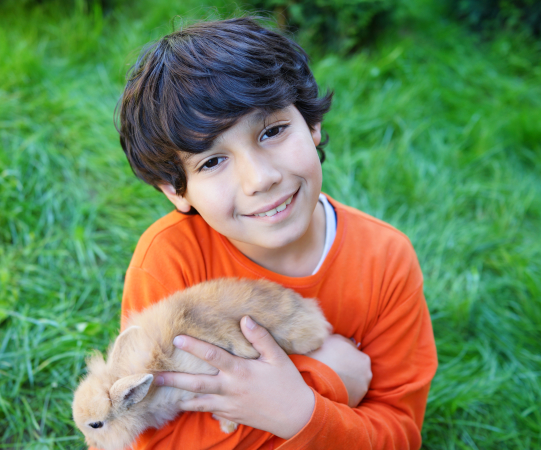
There is no doubt that pets can provide their owners, both young and old, with a lot of happiness. Choosing the right pet best suited for your family is vital. What if your child asks you about owning a pet rabbit?
The benefits of owning a pet rabbit extend far beyond the fact that they are cuddly and entertaining. Rabbits are affectionate, quiet, and very easy to train. They are also ideal for both large and small households.
Which important life skills can a pet rabbit teach children?
Responsibility
An essential life skill children can learn when it comes to owning a rabbit is responsibility. Teaching kids how to care for a pet rabbit teaches them responsibility and discipline.
Explain to your child that a rabbit must be fed and cared for daily. A rabbit, unlike other house pets, requires a specific diet. Rabbits are herbivores, and rabbit food includes hay, grasses, fresh vegetables, and the occasional fruit. When children understand that a rabbit’s diet is quite specific, they are more likely to use critical thinking when making decisions.
Giving your children responsibilities can make them feel more self-assured. Positive praise and encouragement assist in the development of confidence in a child’s capabilities.
Consistency
Just like children need a routine, rabbits are happier and more relaxed if they have some routine. Rabbits need their enclosures cleaned daily, water bottles filled regularly, and their food and bedding need to be replenished daily.
Creating a list of responsibilities and carrying out their chores daily will help children become consistent. Consistency teaches children to be reliable, and their pet rabbit relies on them to be fed and cared for.
Consistency is key to teaching children to meet their obligations. It also teaches children discipline and self-control. Consistency also encourages kids to accept responsibility for their actions, which is essential for developing healthy habits.
Respecting Boundaries
Every rabbit has its own distinct personality. It would surprise you to learn that not all rabbits are nearly as cuddly as people think. They don’t always appreciate being held and won’t hesitate to kick or bite to break free.
A rabbit that shows no interest in being picked up or held should be left alone. Rabbits are skittish animals, and just like we want to be left alone at times, rabbits need alone time too.
A rabbit as a family pet will allow you to teach your child how to respect your rabbit’s boundaries. An important lesson you as a parent can teach is to encourage your children to set their boundaries. You’re not only teaching your children to think independently, but you’re also teaching them how to treat themselves and others.
It might seem like a little too much responsibility for a pet rabbit to teach children about boundaries; however, the rabbit is setting its boundary, which needs to be respected. This is useful in teaching children that everyone, even our pets, has different likes and dislikes and levels of comfort.
Social and Communication Skills
Rabbits are incredibly loving and social animals, which means they not only like spending time with their humans, but they also demand it. Rabbits value companionship, much like we do.
Children understand that a pet would love and accept them unconditionally, which boosts their self-esteem. Furthermore, evidence shows that caring for a pet improves a child’s social, emotional, and cognitive development.
Owning a pet also helps improve language and communication abilities. Children communicate with their pets, reveal their thoughts, show sympathy, and sometimes even include them in their pretend-play settings.
For children, having a pet is also an essential social skill. Children will tell their classmates about their pet rabbit, which is a great way to start conversations and make new friends.
Empathy and Compassion
A crucial life skill that a pet rabbit can teach children is being kind to one another, regardless of our differences. A family pet can teach children to be compassionate and kind to animals and others despite their differences. Compassion and kindness go hand-in-hand with respect and responsibility.












